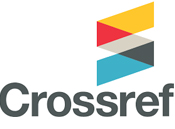Enhancing Mathematics Achievement with Problem-Based Learning: A Classroom Action Research
Abstract
This research was motivated by the low mathematics learning outcomes of students in class VII-1 SMPN 19 Pekanbaru, which was indicated by the achievement of Learning Objective Achievement Criteria (KKTP) of only 8 out of 36 students. The purpose of this study was to increase learning outcomes and improve the learning process of mathematics through the application of the Problem-Based Learning (PBL) model. This research is a Classroom Action Research (PTK) carried out in two cycles, each consisting of planning, implementation, observation, and reflection stages. The research subjects were 36 students with heterogeneous ability levels. The research instruments included learning tools (ATP and teaching modules) as well as observation sheets of teacher activity, students' activity, and learning outcome tests. The results showed an increase in students' activity in the learning process. Students were more active, able to work together in groups, and able to build their own knowledge meaningfully. The percentage of students who reached KKTP increased from the base score of 38.88% to 52.77% in cycle I, and it increased again to 80.55% in cycle II. Based on these data, it can be concluded that the application of the Problem-Based Learning model is effective in improving the learning process and increasing mathematics learning outcomes.
References
S. Lukáč, “Development and Assessment of Students’ Argumentation Skills in Mathematics Teaching,” in 10th International Conference on Research in Didactics of the Science (DIDSCI+ 2022), 2022, pp. 1–11. doi: 10.1088/1742-6596/3037/1/012019.
Kemendikbudristek, Salinan Keputusan Kepala BSKAP Nomor 033 Tahun 2022 tentang Perubahan atas Keputusan Kepala BSKAP Kementerian Pendidikan, Kebudayaan, Riset dan Teknologi Nomor 008/H/KR/2022 tentang Capaian Pembelajaran pada Pendidikan Anak Usia Dini. Indonesia, 2023.
Permendikbudristek, Salinan Peraturan Menteri Pendidikan, Kebudayaan, Riset, dan Teknologi Republik Indonesia Nomor 21 Tahun 2022 Tentang Standar Penilaian Pendidikan Pada Pendidikan Anak Usia Dini, Jenjang Pendidikan Dasar, Dan Jenjang Pendidikan Menengah. Indonesia, 2022.
R. Rahmawati, S. Heleni, and A. Armis, “Penerapan Model Problem Based Learning untuk Meningkatkan Hasil Belajar Matematika Siswa Kelas VIII-B SMP PGRI Pekanbaru Tahun Pelajaran 2019/2020,” JURING (Journal Res. Math. Learn., vol. 3, no. 4, pp. 375–384, 2020, doi: 10.24014/juring.v3i4.10218.
Kemendikbudristek, Panduan Pembelajaran dan Asesmen Anak Usia Dini, Pendidikan Dasar dan Menengah. Jakarta: Kementerian Pendidikan, Kebudayaan, Riset, dan Teknologi Republik Indonesia, 2022.
Kemendikbud, Salinan Lampiran Permendikbud No 16 Tentang Standar Proses Pendidikan Dasar dan Menengah. Indonesia, 2022.
Z. Fardani, E. Surya, and M. Mulyono, “Analisis Kepercayaan Diri (Self Confidence) Siswa Dalam Pembelajaran Matematika Melalui Model Problem Based Learning,” Parad. J. Pendidik. Mat., vol. 14, no. 1, pp. 39–51, 2021, doi: https://doi.org/10.24114/paradikma.v14i1.24809.
R. P. Sari, Z. Zuardi, R. Reinita, and A. Zikri, “Penggunaan Model Problem Based Learning terhadap Hasil Belajar dalam Pembelajaran Pkn di Sekolah Dasar,” J. Basicedu, vol. 4, no. 1, pp. 221–227, 2020, doi: 10.31004/basicedu.v4i1.324.
S. Suratno, K. Kamid, and Y. Sinabang, “Pengaruh Penerapan Model Pembelajaran Problem Based Learning (PBL) Terhadap Kemampuan Berpikir Tingkat Tinggi (HOTS) Ditinjau Dari Motivasi Belajar Siswa,” J. Manaj. Pendidik. dan Ilmu Sos., vol. 1, no. 1, pp. 127–139, 2019, doi: https://doi.org/10.38035/jmpis.v1i1.249.
N. Aini, Y. F. Surya, and P. H. Pebriana, “Peningkatan Kemampuan Berpikir Kritis Dengan Menggunakan Model Problem Based Learning (PBL) Pada Siswa Kelas IV MI Al-Falah,” J. Pendidik. Dan Konseling, vol. 2, no. 2, pp. 179–182, 2020, doi: https://doi.org/10.31004/jpdk.v2i2.1246.
I. G. A. P. Sriwati, “Penerapan Model Pembelajaran Problem Based Learning untuk Meningkatkan Hasil Belajar Matematika Peserta Didik,” Indones. J. Educ. Dev., vol. 2, no. 2, pp. 302–313, 2021, doi: https://doi.org/10.5281/zenodo.5244635.
E. Safitri, “Implementing the Problem-Based Learning (PBL) Model to Improve Learning Outcomes in Probability in Junior High Schools,” J. Res. Math. Instr., vol. 5, no. 1, pp. 50–59, 2023, doi: https://doi.org/10.33578/jrmi.v5i1.88.
I. Prayogi, A. Armis, and T. Solfitri, “Penerapan Model Problem Based Learning untuk Meningkatkan Hasil Belajar Siswa Kelas VIII-1 SMP Peranap,” AKSIOMA J. Progr. Stud. Pendidik. Mat., vol. 12, no. 2, pp. 2415–2425, 2023, doi: http://dx.doi.org/10.24127/ajpm.v12i2.6695.
S. Arikunto, Suhardjono, and Supardi, Penelitian Tindakan Kelas. Jakarta: Bumi Aksara, 2021.
E. Safitri, “Implementing the Problem-Based Learning (PBL) Model to Improve Learning Outcomes in Probability in Junior High Schools,” J. Res. Math. Instr., vol. 5, no. 1, pp. 50–59, 2023, doi: https://doi.org/10.33578/jrmi.v5i1.88.
N. S. Rahmi, N. W. S. Wardani, and L. A. Soehono, “Improving Statistical Analysis in Supporting Big Data Era for SMA Negeri 1 Krembung Teachers,” J. Innov. Appl. Technol., vol. 10, no. 1, pp. 64–71, 2024, doi: http://dx.doi.org/10.21776/ub.jiat.2024.10.01.012.
Y. W. Purnomo, R. Nabillah, T. A. Aziz, and S. A. Widodo, “Fostering Mathematical Connections and Habits of Mind: A Problem-Based Learning Module for Elementary Education,” Infinity, vol. 13, no. 2, pp. 333–348, 2024, doi: https://doi.org/10.22460/infinity.v13i2.p333-348.
Sarnoko, Asrowi, Gunarhadi, and B. Usodo, “An Analysis of the Application of Problem Based Learning (PBL) Model in Mathematics for Elementary School Students,” J. Ilm. Ilmu Terap. Univ. Jambi, vol. 8, no. 1, pp. 188–202, 2024, doi: 10.22437/jiituj.v8i1.32057.
M. M. V. Lubis, Sakur, and S. N. Siregar, “Improving Mathematics Learning Outcomes Through Problem-Based Learning: A Study on Vocational High School Students in Class XI,” J. Res. Math. Instr., vol. 6, no. 1, pp. 11–20, 2024, doi: https://doi.org/10.33578/jrmi.v6i1.99.
Copyright (c) 2025 Journal of Research on Mathematics Instruction (JRMI)

This work is licensed under a Creative Commons Attribution-NonCommercial-ShareAlike 4.0 International License.






